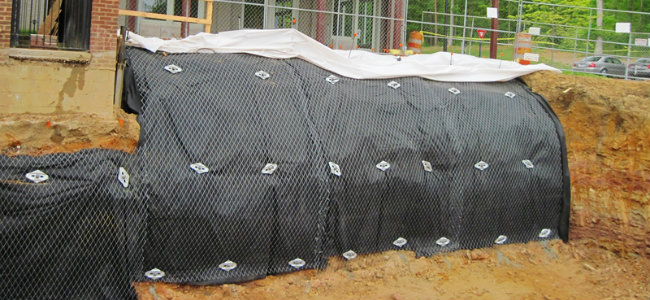On a couple of our projects recently, we needed retaining walls built in “cut earth sections” as opposed to “fill earth sections”. In these projects we needed top down construction and a method that afforded easy accessibility and we were dealing with earth that would only be “cut” and not “filled.”
The alternative? What you see on some interstates today, a “Soil Nail” system. It is economical compared to other top down systems and more flexible in construction technique.
“Soil Nailing” has been around since the early ’70s, first developed in France, and has grown to be a standard for stabilization where ground conditions are right for the application, the water table is manageable and where tight access may pose a challenge to other systems.
Installing soil nails is a multiple-step process involving rebar or hollow threaded bars, head plates, a flexible reinforced mesh followed by shotcrete.
We recently used a soil nail system on a new project for United States Steel and in a project of ours located in Gastonia, North Carolina. Cost-effective, offered a smaller right-of-way and had less of an environmental impact in an area where this is of concern.
Is a Soil Nail Wall a good fit for your development? Take the following into consideration:
- Soil nail walls can be built to follow unique-shaped walls.
- Equipment used is portable and can fit in tight spaces.
- Is usually more cost-effective than other methods meeting similar demands.
- Has less impact environmentally than other methods.
- Soil Nail walls cannot be used where groundwater is a problem.
- Soil on the jobsites must be able to stand unsupported while the Soil Nail Wall is being installed.
- Sites with soil that has low shear strength or lack cohesion cannot use a Soil Nail Wall.
- If a site has poor drainage or is prone to freeze-thaw cycles, Soil Nail walls may not be an effective alternative.



